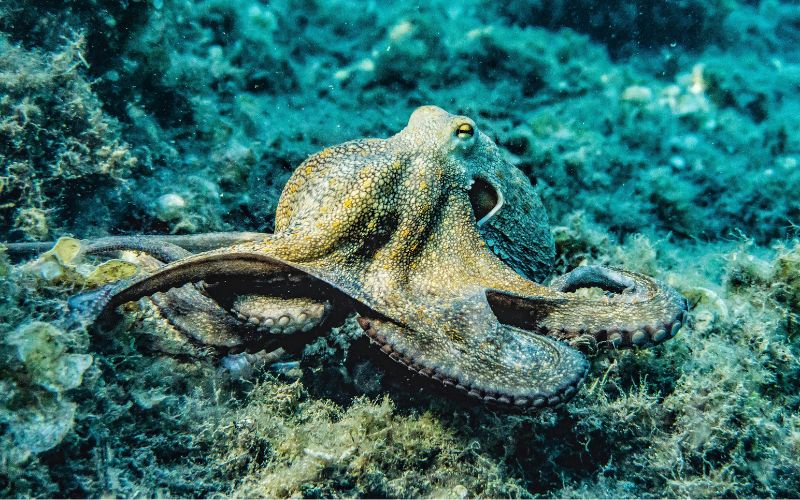The sea provides a variety of nutritious foods, and one of the most distinctive and healthy choices is octopus and which provides humans with lots of Nutritional Benefits of Octopus. It has been enjoyed in Mediterranean, Asian, and coastal cuisines around the world. Octopus is not just tasty; it also offers many health benefits. It provides high-quality protein along with a wide range of essential vitamins and minerals. Because of its nutritional value, octopus is an excellent choice for anyone who wants to improve their diet and health.

In this article from Healthier Life Guide, we’ll cover everything you need to know about the health benefits of eating octopus, including its full of nutritional benefits of octopus for its nutritional value, potential risks, how to cook it properly, and some reasons to consider it in your weekly meal preparations.
What Makes Octopus a Nutritional Powerhouse?
Octopus is recognized as a marine superfood due to its rich nutrient profile and low calorie content. In contrast to several other seafood varieties, octopus has low fat content while being high in protein, omega-3 fatty acids, vitamin B12, selenium, and iron.
Why opt for Octopus Instead of Other Seafood?
When compared to more familiar options such as salmon, shrimp, or tuna, octopus offers a distinct combination of micronutrients. It is very lean and contains minimal saturated fat, which makes it an excellent choice for health-conscious people, those following keto or paleo diets, and individuals controlling their cholesterol levels.
Composition Nutritional Benefits of Octopus
Let’s examine the nutritional content of cooked octopus per 100 grams (approximately 3.5 ounces):
Octopus is particularly rich in vitamin B12, selenium, and copper. These nutrients are essential for nerve function, immune health, and the formation of red blood cells.
Octopus Nutritional Information (Per 100g Serving)
- Nutrient Amount (per 100g)
- Calories 82 kcal
- Protein 14.9 g
- Total Fat 1.0 g
- Saturated Fat 0.2 g
- Cholesterol 48-85 mg
- Carbohydrates 2.2 g
- Sugars 0 g
- Fiber 0 g
- Sodium 230 mg
- Potassium 350 mg
- Calcium 53 mg
- Iron 5.3 mg
- Magnesium 30 mg
- Phosphorus 186 mg
- Zinc 1.7 mg
- Copper 0.4 mg
- Selenium 44.8 mcg (64% DV)
- Vitamin B12 20 mcg (333% DV)
- Vitamin B6 0.5 mg
- Niacin (B3) 2.1 mg
- Omega-3 Fatty Acids ~0.5 g
Key Highlights:
- Octopus, which is completely rich protein and very low in fat per 100g serving.
- It is also an excellent source of vitamin B12 and omega-3 fatty acids per 100g.
- Octopus, which is full of essential minerals such as selenium, zinc, and also iron.
- Moderate cholesterol levels with very little saturated fat.
This makes fully nutritional benefits of octopus a highly nutritious seafood option that aids brain function, hormonal balance, skin health, and muscle recovery. Additionally, it has a low-calorie profile.
Health Advantages of Consuming Octopus

Incorporating octopus into your diet on a regular basis can offer various health benefits thanks to its remarkable nutritional profile. Let’s examine how octopus can enhance your well-being.
1. Excellent Source of Protein for Muscle Development
With nearly 15 grams of protein in every 100g, octopus serves as a fantastic source of complete protein. It provides all nine essential amino acids your body requires for muscle recovery, metabolism enhancement, and maintenance of lean body mass.
2. Abundant in Antioxidants
Octopus is a source of taurine, a compound known for its antioxidant capabilities, which may aid in minimizing oxidative stress in cells. Additionally, selenium acts as a powerful antioxidant, supporting thyroid health and cell repair.
3. Enhances the Immune System
The nutritional benefits of octopus are rich in zinc, copper, and selenium. These essential nutrients contribute to the strengthening of your immune system, help protect against infections, and promote quicker recovery.
Disadvantages of Consuming Octopus
Though the Nutritional Benefits of Octopus are a good source of vital nutrients, there are several drawbacks to keep in mind:
1. Moderate Cholesterol Levels
The nutritional benefits of octopus contain approximately 48-85 mg of cholesterol per 100g, which is fairly moderate. Although dietary cholesterol has less impact on blood cholesterol levels than was once believed, individuals with heart disease or high cholesterol should monitor their intake.
2. Risk of Heavy Metal Contamination
Similar to various seafood types, octopus can absorb heavy metals like mercury and cadmium from the ocean. While it typically has low mercury levels, consuming excessive poorly sourced octopus could pose health risks over time.
3. Potential for Allergic Reactions
Octopus can provoke allergies, particularly in those already allergic to shellfish or other seafood. Symptoms may range from hives and itching to nausea or even severe cases like anaphylaxis.
4. Digestive Sensitivity Issues
Some individuals might experience bloating or gas, particularly if the octopus is undercooked or ingested in large quantities. Its chewy texture can also present challenges for those with sensitive digestive systems.
5. Ethical and Environmental Concerns
Octopuses are known to be intelligent creatures. This raises ethical questions regarding the farming and consumption of octopus. Additionally, unregulated fishing practices can have negative effects on the environment.
Octopus and Testosterone Enhancement
Consuming octopus can naturally aid testosterone production due to its nutrient-rich profile:
1. Zinc’s Role in Hormonal Health
Zinc is associated with maintaining healthy testosterone levels, sperm production, and fertility. Octopus is a good source of bioavailable zinc, making it advantageous for male hormone health by nutritional benefits of the octopus.
2. Vitamin B12 for Energy
Vitamin B12 is involved in energy metabolism and supports brain health, fostering an environment conducive to testosterone production.
3. Inclusion of Omega-3 Fatty Acids
Omega-3 fatty acids assist in reducing inflammation and enhancing overall endocrine function, which aids in maintaining balanced testosterone levels in both genders.
4. Selenium for Antioxidant Defense
Selenium supports testicular health, provides robust antioxidant protection, and shields reproductive cells from damage—all vital for optimal testosterone levels.
For fitness enthusiasts and men over 30 seeking natural hormone support, the nutritional benefits of octopus are an excellent dietary addition.

Are the Nutritional Benefits of Octopus Considered High in Cholesterol?
Many health-aware individuals ponder, “Is octopus high in cholesterol?” The answer is:
Yes, but it’s not overly worrying. It has about 48-85 mg of cholesterol per 100g.
This amount is lower than that of shrimp and similar to eggs.
The Positive Aspect:
The nutritional benefits of octopus is low in saturated fat (only about 0.2g per 100g), which contributes to unhealthy cholesterol levels.
Additionally, it contains omega-3s, which may elevate HDL (“good”) cholesterol.
Should You Be Concerned?
If you’re healthy and consume octopus occasionally, it should not negatively affect your cholesterol levels.
However, if you have elevated LDL cholesterol, it’s advisable to manage portion sizes and choose grilled or boiled octopus without butter or oil.
Octopus Benefits for Skin
Seeking vibrant, healthy skin? The nutritional benefits of octopus could be beneficial, thanks to its abundant skin-nourishing nutrients:
1. Enhances Collagen Production
Octopus is rich in zinc and copper, essential minerals for collagen creation, which helps sustain skin elasticity and youthfulness.
2. Counteracts Aging
The taurine and selenium found in octopus offer antioxidant properties that help diminish fine lines and wrinkles by combating oxidative damage.
3. Hydrating Effects
Omega-3 fatty acids in octopus help maintain skin hydration, reduce inflammation, and fortify the skin barrier, leading to smoother and more resilient skin.
4. Aids in Skin Repair
Zinc and selenium may also accelerate wound healing, making octopus beneficial for individuals with acne-prone or damaged skin.
5. Potential to Lessen Hyperpigmentation
Vitamin B12 helps with the turnover of skin cells and may promote a more uniform skin tone, aiding in the reduction of dark spots and blemishes.
In fact, several Korean skincare brands incorporate the nutritional benefits of octopus extract in their serums and masks for its anti-aging and skin-firming benefits.
Octopus and Cardiovascular Health
The omega-3 fatty acids found in octopus are essential. Omega-3s are recognized for their protective qualities for the heart, as they help:
- Lower triglyceride levels
- Decrease blood pressure
- Lower the risk of arrhythmias
- Slow down plaque accumulation in arteries
Incorporating octopus into your meals can enhance your heart health, particularly if you’re aiming to manage cholesterol and reduce the likelihood of heart disease. Discover more nutritional benefits of octopus, just follow us.
Enhancing Brain Health with Octopus
Octopus benefits your brain due to its:
- High vitamin B12 levels
- Essential fatty acids
- Choline
- Copper and zinc
These nutrients collectively work to support cognitive abilities, enhance memory, and reduce the chances of age-related neurodegenerative disorders such as Alzheimer’s.
In cultures where seafood, especially octopus, is consumed frequently, rates of cognitive decline tend to be lower. The Mediterranean diet, which includes the nutritional benefits of octopus, has been associated with improved long-term brain health.
Octopus and Weight Control
Octopus is a great choice for weight loss and weight management, as it has few calories and is high in protein. Consuming protein helps keep you satiated for longer periods, thus lowering the likelihood of indulging in snacks between meals.
Its minimal fat and carbohydrate content also makes it ideal for:
- Low-carb diets
- Keto diets
- Calorie-restricted plans
- Intermittent fasting approaches
Octopus in a Sports Enthusiast’s Diet
Individuals who are athletic or physically active require lean proteins and essential micronutrients for muscle repair, endurance, and energy processing. The Nutritional Benefits of Octopus satisfy these requirements:
- some essential components of B vitamins are for converting food into energy.
- Iron and copper transport oxygen to active muscles
- Zinc and selenium boost the immune system during intense workouts.
The Nutritional Benefits of Octopus are naturally free from gluten and dairy, which makes it a safe protein option for athletes with dietary restrictions.
Possible Concerns and Risks
Despite its many advantages, there are certain factors to consider when consuming octopus:
1. Cholesterol Levels
Octopus contains cholesterol (approximately 48mg per 100g). The effect of dietary cholesterol on blood cholesterol is less significant than that of saturated fats. However, individuals with pre-existing conditions should monitor their consumption.
2. Heavy Metals and Toxins
Mercury content is a concern for various seafood types. Nevertheless, octopus generally has low mercury levels, making it a safer choice than other options like swordfish or tuna. Always purchase from reliable sources.
3. Allergies
Those with shellfish allergies should exercise caution. Although octopus is classified as a cephalopod rather than a crustacean, there can be cross-reactivity among seafood allergies.
Cooking for Optimal Nutritional Benefits of Octopus
Grilled Octopus
Grilling octopus accentuates its natural taste while preserving most nutrients. Marinate it in olive oil, garlic, and lemon for a nutritious Mediterranean dish.

Boiled or Poached
Preparing the fully nutritional benefits of octopus by boiling or poaching is a method that uses little fat. It can be incorporated into salads or cold dishes for a protein-packed meal.
Avoid Deep Frying
Deep frying introduces unnecessary fats and calories. opt for healthier cooking techniques to maintain the nutritional value of octopus.
Concluding Thoughts on Nutritional Benefits of Octopus
Incorporating octopus into your diet can provide significant advantages for your heart, brain, muscles, and metabolism. With its low caloric content, high-quality protein, and abundance of vital nutrients, the Nutritional Benefits of Octopus stand out as one of the healthiest seafood choices for overall well-being.
To reap the full nutritional rewards of octopus, aim to consume it 1-2 times weekly, prepare it using healthy cooking methods, and pair it with fresh vegetables, whole grains, or legumes.
Allow Healthierlifeguide.com to support you in incorporating nutrient-dense seafood into your routine. Your body and mind will thank you. To know more about us, click here


1 thought on “Best Nutritional Benefits of Octopus in 2025: A Superfood from the Sea”